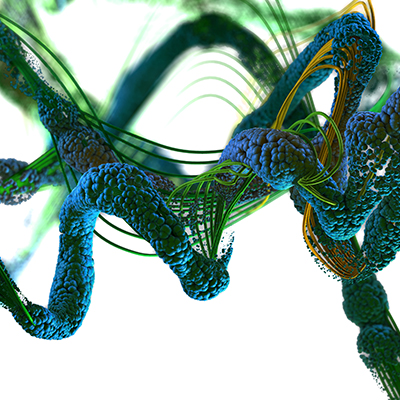 Protein tail mutation may cause rare genetic diseases
Protein tail mutation may cause rare genetic diseases
Researchers from Germany found that a change in a protein’s charge disrupts cellular self-organization, resulting in an extremely rare hereditary developmental disorder called brachyphalangy-polydactyly-tibial aplasia/hypoplasia syndrome (BPTAS). Read More
 MicroRNAs strongly associated with type 2 diabetes in study
MicroRNAs strongly associated with type 2 diabetes in study
Scientists at the NIH’s National Human Genome Research Institute (NHGRI) have found a set of small RNA molecules, called microRNAs, in human pancreatic cells that are strongly associated with type 2 diabetes. Read More
 Mechanistic effect of omega-3 fatty acid on multiple sclerosis progression revealed in preclinical study
Mechanistic effect of omega-3 fatty acid on multiple sclerosis progression revealed in preclinical study
Preclinical research has revealed the mechanism through which omega-3 fatty acids may exert positive effects on inflammation and neurological health. Read More
 Tiny but mighty gene fragments maintain blood glucose levels
Tiny but mighty gene fragments maintain blood glucose levels
Researchers have discovered that tiny gene fragments called microexons are prevalent in pancreatic islets – tissues that host beta cells which produce insulin. The findings, published February 9 in Nature Metabolism, indicate that microexons may constitute new therapeutic targets for diabetes treatment. Read More
 Study finds 41% of infant deaths associated with genetic diseases
Study finds 41% of infant deaths associated with genetic diseases
Researchers from Rady Children’s Institute for Genomic Medicine have found that the genetic disease contribution to infant deaths is higher than expected. Read More
 Risk prediction models are more cost-effective than current lung cancer screening policy: study
Risk prediction models are more cost-effective than current lung cancer screening policy: study
Risk-based lung cancer screening is more cost-effective than the current model used in the U.S., a study funded by the National Cancer Institute (NCI) has found. Read More
 Researchers discover small molecules that render spike proteins harmless
Researchers discover small molecules that render spike proteins harmless
The infamous spike proteins on the surface of SARS-CoV-2 enable it to bind with and enter human cells. Because of their key role in spreading infection, these spike proteins are one of the main targets for COVID-19 vaccines and treatments. Read More
 Vaccine effectiveness against Omicron variants may change over time
Vaccine effectiveness against Omicron variants may change over time
Researchers from The Chinese University of Hong Kong and the Harvard T.H. Chan School of Public Health in Boston, Massachusetts collaborated on a case-control study and found that two vaccines were generally effective over time against severe outcomes from SARS-CoV-2 Omicron infection. The research, published February 3 in the journal JAMA Network Open, also showed that protection among older individuals was more likely to wane six months after the second dose. Read More
 Fluorescent RNA enables real time detection of neurodegenerative disease driver in live cells
Fluorescent RNA enables real time detection of neurodegenerative disease driver in live cells
Writing in Nucleic Acids Research, scientists at Hokkaido University in Japan and the KTH Royal Institute of Technology in Sweden describe the development of a technique for studying a RNA structure called a G-quadruplex. Read More
 Genes for coronary artery disease identified
Genes for coronary artery disease identified
University of Virginia researchers and their collaborators have identified genes that play a key role in the development of coronary artery disease, the number one cause of death worldwide. The research, published recently in Circulation Research, may provide scientists with promising therapeutic targets as they work to develop new and improved treatments. Read More
Conferences
Science Briefs
Member Rewards
Earn points for contributing to market research. Redeem your points for merchandise, travel, or even to help your favorite charity.
Research Topics
Interact with an engaged, global community of your peers who come together to discuss their work and opportunities.
Connect
Tweets by @ScienceBoard






